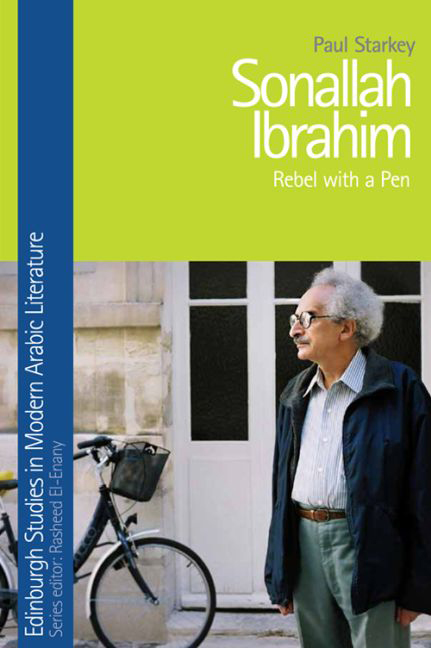Book contents
- Frontmatter
- Contents
- Series Editor's Foreword
- Preface
- 1 Introduction: Background and Context
- 2 Rebel with a Pen
- 3 Cairo Prison: Tilka al-raʾiha (1966)
- 4 Michelangelo and the Dam: Najmat Aghustus (1974)
- 5 CocaColaland: al-Lajna (1981)
- 6 War in Lebanon: Bayrut, Bayrut (1984)
- 7 Consumer Society: Dhat (1992)
- 8 Prison of Dishonour: Sharaf (1997)
- 9 Widening Horizons (1): Sex, Memory and Revolution: Warda (2000)
- 10 Widening Horizons (2): In the Land of the Capitalists: Amrikanli (Amri Kan Li) (2003)
- 11 Return to Childhood: al-Talassus (2007)
- 12 The French Connection: al-ʿImama wa-al-Qubbaʿa (2008) and al-Qanun al-Faransi (2008)
- 13 Filling a Gap: al-Jalid (2011)
- 14 Epilogue
- Bibliography
- Index
3 - Cairo Prison: Tilka al-raʾiha (1966)
Published online by Cambridge University Press: 23 September 2017
- Frontmatter
- Contents
- Series Editor's Foreword
- Preface
- 1 Introduction: Background and Context
- 2 Rebel with a Pen
- 3 Cairo Prison: Tilka al-raʾiha (1966)
- 4 Michelangelo and the Dam: Najmat Aghustus (1974)
- 5 CocaColaland: al-Lajna (1981)
- 6 War in Lebanon: Bayrut, Bayrut (1984)
- 7 Consumer Society: Dhat (1992)
- 8 Prison of Dishonour: Sharaf (1997)
- 9 Widening Horizons (1): Sex, Memory and Revolution: Warda (2000)
- 10 Widening Horizons (2): In the Land of the Capitalists: Amrikanli (Amri Kan Li) (2003)
- 11 Return to Childhood: al-Talassus (2007)
- 12 The French Connection: al-ʿImama wa-al-Qubbaʿa (2008) and al-Qanun al-Faransi (2008)
- 13 Filling a Gap: al-Jalid (2011)
- 14 Epilogue
- Bibliography
- Index
Summary
We begin our exploration of Sonallah Ibrahim's novels, then, with Tilka al-raʾiha, perhaps the best-known and arguably still the most controversial of the author's works, not only for the heated reaction that it provoked in the censor's office, but also for the controversy it aroused among the Egyptian literary establishment – the author Yahya Haqqi (1905–93), for example, a man previously known for his generally liberal views, remarking that he found one scene ‘absolutely disgusting’. The work not only marks a seminal moment in the development of contemporary Egyptian (and, more generally, Arabic) literature, but is also arguably unique among such works in that as much, if not more, discussion has probably taken place about the work's circumstances of publication as about the literary qualities of the work itself.
The Background
The political and literary background to the publication of this work (which for the purposes of the present discussion we will categorise as a novel, though ‘novella’ might be a better description) has for the most part been covered in previous chapters. The work is clearly heavily dependent on the author's own experiences of life in Cairo, both inside and outside of prison, and it reflects the stifling political atmosphere that had begun to envelop Cairo (and indeed, Egypt more generally) as the heady initial optimism of the 1952 Free Officers’ Revolution wore thin, to be replaced by a mood of disillusion bordering on despair. The situation of the work's narrator/ protagonist in turn reflects that of the author himself – the course of whose life, as an Egyptian Marxist and member of Haditu (Democratic Movement for National Liberation), had inevitably been dependent in the late 1950s and early 1960s on the vagaries of the Nasserist regime's relationship with the Egyptian Communist Party and its various factions. The attitude of these factions towards the regime was itself a fluctuating one. The communists had initially welcomed the Free Officers’ coup of 1952, but quickly broke with them following the hanging of the leaders of a strike at the Kafr al-Dawwar textile factory later that year. For his part, Nasser's own stance was dictated by a combination of internal and external factors.
- Type
- Chapter
- Information
- Sonallah IbrahimRebel with a Pen, pp. 34 - 50Publisher: Edinburgh University PressPrint publication year: 2016



